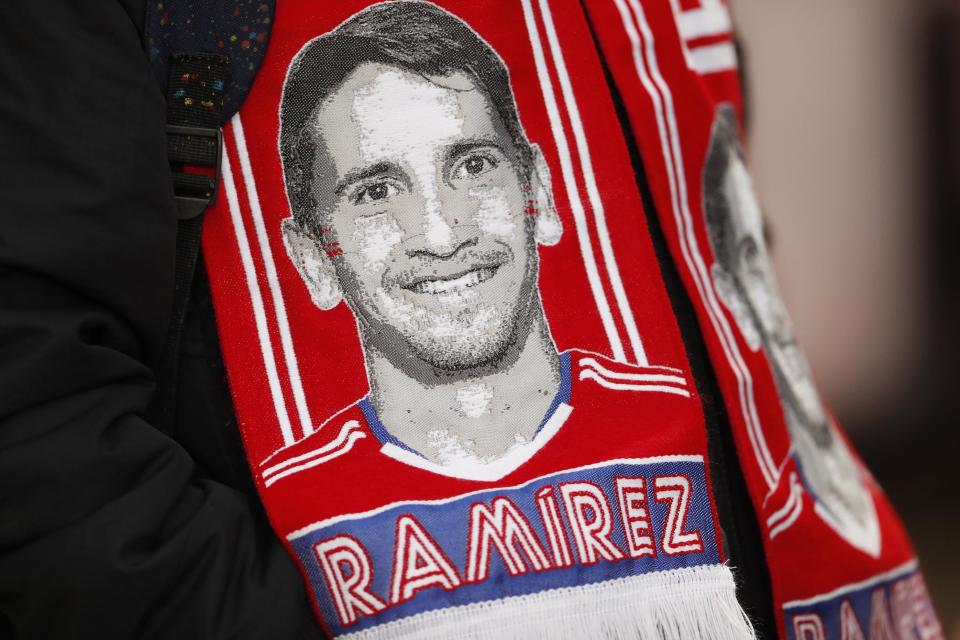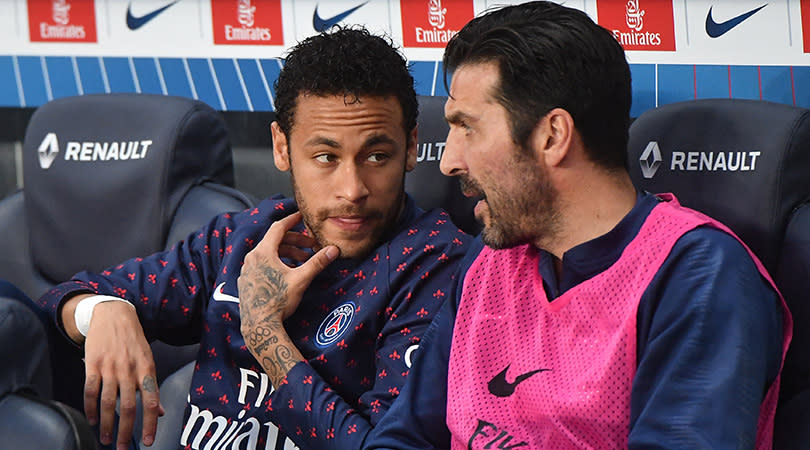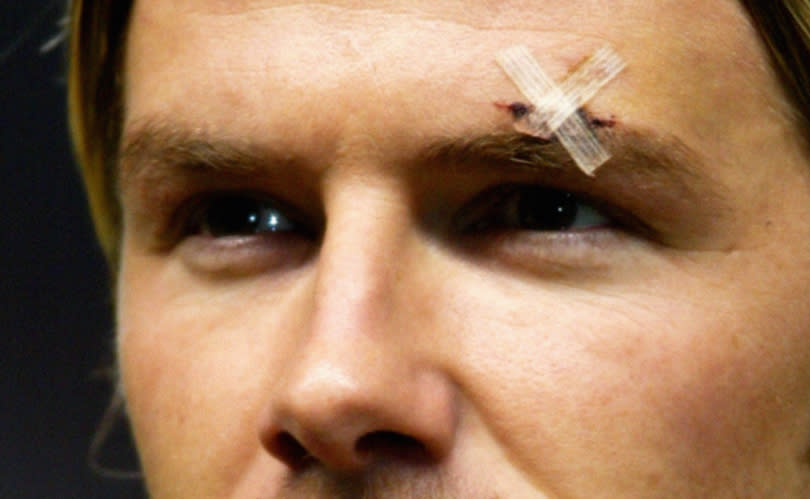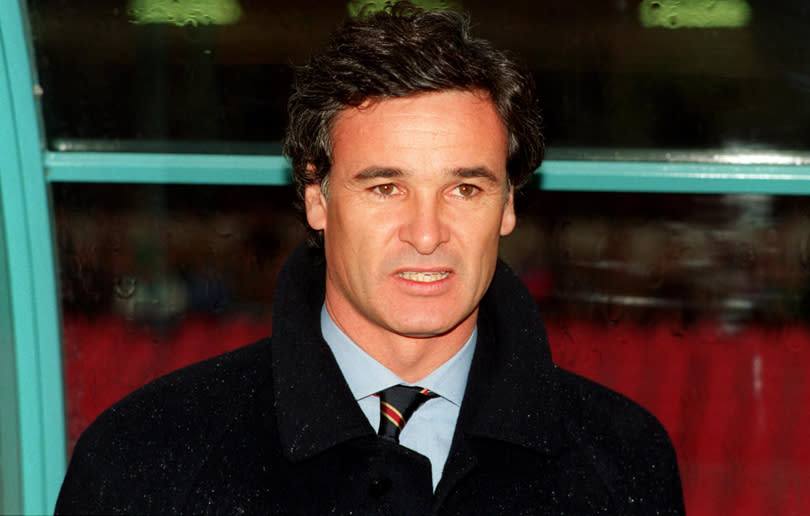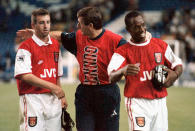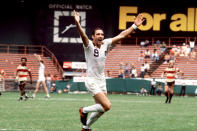8 players who were bigger than the club (or thought they were, anyway)
Malcolm Macdonald (Newcastle)
Newly appointed Newcastle manager Gordon Lee and the Magpies’ star striker Malcolm MacDonald were never destined to see eye to eye, especially after Supermac was quoted in the Newcastle Evening Chronicle as asking “Who is Gordon Lee?” after the ex-Blackburn boss took the hot seat in summer 1975.
“My cards were marked after that rather unfortunate start,” remarked MacDonald wryly several years later. During the rather uncomfortable 1975/76 campaign, Lee made a point of subbing MacDonald on a regular basis and informed him: “You’re not a good pro, MacDonald, there’s more to football than scoring goals” after the latter scoffed at Lee’s training routines.
Twelve months later, Supermac joined Arsenal for an eye-catching £333,333.33 fee. “He’s not worth it,” Lee blasted. MacDonald plundered goals aplenty for the Highbury side, while Lee bailed out of St James’ Park within 18 months before later managing Everton, Preston and KR Reykjavik.
Ian Wright (Arsenal)
“Bruce Rioch labelled me Charlie Big Potatoes,” blasted 32-year-old Arsenal striker Ian Wright after deciding to hand in a transfer request in February 1996.
The new Arsenal manager had attempted to introduce a passing game to the Highbury side, and Wright felt increasingly starved of the ball. Matters came to a head after the pair had a screaming match in the dressing room following the Gunners’ FA Cup defeat against Sheffield United, and Wright became increasingly exasperated when Rioch claimed his former Bolton striker John McGinlay would have tucked away a chance he missed.
The vocal striker made his annoyance clear to vice chairman David Dein, and the writing was on the wall for Rioch, who only lasted a season at Highbury. Wright stayed, and broke Arsenal’s goalscoring record.
Pierre van Hooijdonk (Nottingham Forest)
“The situation could have been handled differently, I accept that now,” admitted a contrite Pierre van Hooijdonk a decade after his notorious one-man strike at Dave Bassett’s Nottingham Forest.
After netting 34 goals during Forest’s promotion season to the Premier League in 1997/98, the headstrong Dutchman was horrified when, instead of strengthening the squad, the City Ground club sold striker Kevin Campbell to Trabzonspor for £2.5m and fans’ favourite Colin Cooper to newly promoted Middlesbrough.
After his transfer request was rejected, Van Hooijdonk refused to play and trained with former club NAC Breda to keep up his fitness levels. After a three-month stand-off he returned to the starting lineup, but quickly discovered that manager Bassett hadn’t wanted him to regain his berth.
“I’d have told Pierre where to shove the olive branch,” fumed the Forest boss, who was dismissed in January 1999 with the club headed back to the second tier. New man David Platt finally sold the sulky striker to Vitesse Arnhem in July, remarking: “It’s probably for the best that Pierre doesn’t return to this part of England for some time.”
Van Hooijdonk never did either, later turning out for Benfica, Feyenoord (twice), Fenerbahce and NAC Breda.
Diego Maradona (Napoli)
Following Maradona’s world record £6.9m move to Serie A side Napoli in 1984, a local newspaper claimed: “We have no mayor, houses, schools, buses, employment and sanitation, but none of this matters because we have Diego Maradona.”
The sublime Argentine’s arrival ushered in the most gilded era of Napoli’s existence, and they won Serie A in 1987 and 1990. But off the field, his personal problems increased. He racked up over $70,000 in fines for missed training sessions and matches, and there were concerns over his links with the Mafia-linked Camorra.
By the time new boss Claudio Ranieri arrived at the club in July 1991, Maradona was serving a 15-month ban for testing positive for cocaine. “I’d love to work with him,” admitted Ranieri, “but no one – not even Diego – is bigger than this club.”
His ban served, Maradona departed to Seville and was never the same player again.
Rodney Marsh (Manchester City)
When Marsh joined Manchester City from QPR for a hefty £200,000 in March 1972, manager Malcolm Allison claimed the forward would be the missing piece in their title-winning jigsaw. Instead, Marsh’s arrival at Maine Road derailed their title bid, with team-mates accusing him of breaking up the rhythm of their attacks and “juggling the ball like a bloody seal”.
Despite their reservations about Marsh’s work ethic, the Londoner stayed for four years, but success continued to elude City. After a spell in the reserves for criticising manager Tony Book's team selection, Marsh was asked by his gaffer: “If you think I’m useless, it’s not going to work. Do you want to take it back?” “No chance, you’re not even that good,” came the response.
Marsh was quickly on his way to Cork Hibernians and then the Tampa Bay Rowdies, with team-mate Dennis Tueart claiming he “spent too long messing about with his hair and talking to his London journalist friends”.
David Beckham (Manchester United)
Although Beckham claimed that he and Manchester United boss Alex Ferguson had a “father-son” relationship, it began to disintegrate midway through the 2002/03 campaign. An early-season injury meant Becks struggled for form, and following defeat to Arsenal at Old Trafford in the FA Cup in March 2003, Boot Gate suggested that the England midfielder was headed for the exit.
In one of his many books, former United supremo Fergie suggested that Beckham had failed to acknowledge he hadn’t tracked back properly for one of the Gunners’ goals. Stories surfaced that Fergie also disapproved of Beckham’s celebrity lifestyle, beanie hats, sharp hairdos and the fact he “made it his mission to be known outside the game”.
Despite strong interest from Barcelona, Becks signed for Real Madrid and, in Fergie’s opinion, “didn’t quite make it into the pantheon of United legends”. Beckham later shrugged off Ferguson’s verbal jousts, noting: “Someone as successful as that is entitled to their opinion.”
RECOMMENDED Gazza, Becks, Robinho: 5 huge transfers that weren't... but what if they had been?
Tony Yeboah (Leeds)
“I don’t think George Graham liked me very much,” claimed former Leeds hitman Tony Yeboah. “I think he expected me to be trouble.”
When the dour Scot took over at Elland Road in autumn 1996, he wasn’t convinced that the Ghanaian striker – a fan favourite at Elland Road following his bewildering thunderbolts against Liverpool and Wimbledon the previous season – was the man to revive Leeds’s flagging fortunes.
Yeboah – who admitted to having gained a few pounds due to his penchant for Yorkshire puddings – was regularly substituted, or asked to plough a lone furrow up front. The end came in March 1997.
With his new charges trailing Tottenham 1-0, Graham substituted the two-time Bundesliga top scorer and replaced him with a defender. Yeboah, whose golden spell lasted only a year, took off his shirt and hurled it in Graham’s direction. It wasn’t a wise move. He never played again for Leeds, with Graham claiming: “Yeboah doesn’t currently have the right team ethic to justify me picking him.”
Giorgio Chinaglia (New York Cosmos)
Back in 1976, the NASL wasn’t used to players arriving in their pomp. So when Lazio hero and former Italy international Chinaglia was lured to the Big Apple by Cosmos bigwig Clive Toye, the American side were naturally thrilled.
But Chinaglia, who'd actually began his career at Swansea, came with baggage. He’d left Italy in the first place because of threats to his safety from opposition fans, but that didn’t stop him getting tough from the off in New York.
“Chinaglia walked in on his vacation in 1975 and told us he wanted to come. Either that, or he’d buy his own franchise,” later recalled then-president Toye, who also once declared his old player “uncoachable”.
“I'm uncoachable, it's true,” Chinaglia retorted. “That's because I know more than the stupid coaches.”
Still, the relationship was a fruitful one: Chinaglia stayed there for seven years playing alongside (and aggravating) the likes of Pele, Carlos Alberto and Franz Beckenbauer, netting 397 goals along the way. “I am a finisher,” he declared in 1978. “That means when I finish with the ball, it is in the back of the net.”
After retiring in 1983 he became Lazio’s president and then inherited a 60% stake in the Cosmos the following year, delegating responsibilities elsewhere before the failing franchise completely folded in 1986. Still, in 2014 the reborn Cosmos retired the No.9 shirt in his honour.
While you're here, why not take advantage of our brilliant subscribers' offer? Get 5 issues of the world's greatest football magazine for £5 – the game's greatest stories and finest journalism direct to your door for less than a pint in London. Cheers!
NOW READ
LIST 9 managers who made the critics look stupid
QUIZ! Can you name the 50 most expensive centre-back transfers of all time?

 Yahoo Sport
Yahoo Sport 






































